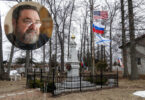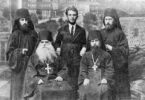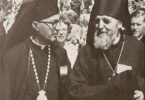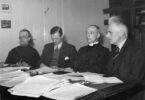The Bishops’ Council, having approved the personal reply by Vladyka Anthony to Metropolitan Sergius’ decree regarding the sanctions that have been imposed upon the Russian hierarchs, felt it necessary to address the flock Abroad with a circular message:
“The Acting Locum Tenens of the Patriarchal Throne, Metropolitan Sergius, who has repeatedly threatened the hierarchs and clergy Abroad with ecclesiastic penalties for refusing to submit to his authority under the condition of a prior written expressed obligation of loyalty to the Soviet regime in all of its ecclesiastic and social activity, has currently decided, according to his own expression, “to change from words to actions.” His decree of June 22, 1934, imposes an ecclesiastical trial upon one of the above hierarchs while imposing suspension upon those of us with more seniority, whom he regards as being more responsible, with the Most Blessed Metropolitan Anthony at the head.
Upon consideration of this decree the Council of Russian Hierarchs Abroad cannot recognize the canonical validity of the determinations set forth in it, since they lack any canonical basis.
The Council rejects the validity of the sanctions imposed upon the bishops abroad, first of all because it absolutely cannot regard as fair the main accusation leveled upon them — causing schism in the Church. Basil the Great’s first canon calls schismatics “those who having separated themselves (from the Church) in opinions regarding certain church matters and issues allowing treatment.” Basil the Great regards meetings as self-willed gatherings when they are “formed by disobedient presbyters or bishops and unlearned public,” who have stepped out, “leaving the Catholic Church.”
All who treasure the truth can testify that neither we nor our flock have ever separated from the Church in teachings regarding various ecclesiastical matters, and we have never separated from the Catholic Church in general or from our Mother Church in Russia. While we are torn away temporarily, by force of circumstances and independently of our wishes, from our country and our native Church, we have been living, however, in an unbroken spiritual union with this Church, rejoicing in its joys, grieving over its griefs, and praying for its head, its archpastors, pastors, and people of the Church, as well as for its martyrs and confessors, asking the Heavenly Helmsman of the Church to strengthen it with His Grace in these days of great trials. Our difference with the current Acting Locum Tenens of the Patriarchal Throne, Metropolitan Sergius, started only from the time when he published his well-known declaration of June 16/29, 1927, in which he acknowledged the Soviet regime as normal and legitimate, and suggested that the entire Russian flock obey this regime not just “out of fear but out of conscience.” At the same time, he demanded from us and our clergy as well a written declaration of complete loyalty to the Soviet regime in all our ecclesiastical and social activities. In other words, he demanded of us, if not inner, at least outer reconciliation with it and a refusal of any struggle against Communists, even if it was conducted as a matter of principle from a religious and moral point of view.
Acting in full unity of heart with our clergy and flock, we, however, absolutely refused to fulfill this demand as being in opposition to God’s will, which commands us to fight against God’s enemies, and is harmful for the Church and Russian Orthodox people, for whose defense the so-called Russian refugees and especially the bishops of the Russian Church had perhaps been sent into the dispersion, where the cruel and destructive arm of the Soviet regime does not reach.
Due to the circumstances of Russian life, it is impossible to determine where the genuine will of the Supreme Church Authority in Russia is active, and where evil will is active.
The only solution to this uncertain and agonizing situation was to proclaim the part of the Russian Church that is abroad to be temporarily independent of the Moscow Patriarchate, as was done by the Council in 1927.
Aware of our correctness, we could not step away from the decision we had made when we started being threatened with a trial and ecclesiastical penalties as well. In its 1933 message the Council of Bishops Abroad gave detailed proof that in view of the current disorder of Russian church life in general and the impossibility of having correct relations with the Supreme Church Authority in Russia, a legitimate canonical trial over us is impossible at this time and must be postponed until the restoration of ecclesiastical order in Russia. Nonetheless, Metropolitan Sergius has already started producing a trial over the hierarchs outside Russia , but without taking the trouble to refute our Council’s arguments, and did not invite, as prescribed by Apostolic Canon 34 and Canon 19 of the Council of Carthage, the accused bishops to a pretrial meeting of the Council to present explanations in response to the accusations that have been leveled against them.
Essentially, it should be noted that out of the three Apostolic Canons 31, 34, and 35, on the basis of which Metropolitan Sergius and His Synod are attempting to justify their unjust ruling, the first and last one do not apply to this case. Apostolic Canons 31 refers to a presbyter who “despising his own bishop, shall collect a separate congregation and erect another altar,” which is not the case in the given circumstances. Canon 35 forbids a bishop from ordaining “beyond his own limits, in cities and places not subject to him,” so there would not be confusion of diocesan jurisdictions, which is again inapplicable to this situation.
And Canon 34, which lies at the basis of the canonical and administrative structure of each local church, proclaims “The bishops of every nation must acknowledge him who is first among them and account to him as their head, and do nothing of consequence without his consent. But each may do those things only which concern his own diocese and the places which belong to it. But neither let him, who is the first, do anything without the consent of all, for so there will be unanimity, and God will be glorified in the Lord through the Holy Spirit.” This defines the inner relationships between bishops of each individual church and its head under normal conditions of governmental and social life.
However, when the people, i. e. the church body, become divided into parts, when persecuted believers are obliged to flee into the desert or hide in catacombs, when any connection is severed between the head of the Church and individual bishops subject to him and their flock, who find themselves outside of their ecclesiastical territory, then it becomes necessary to organize church life in dispersion and within the borders of other nations, and sometimes even of other autocephalous churches. When that happens Apostolic Canon 34 is simply inapplicable. Apparently, such extraordinary situations in church life require some special rules of internal church administration. And they are given by His Holiness Patriarch Tikhon and the Holy Synod in the decree of November 7/20, 1920, whose deepest sense lies in the fact that it is intended precisely for such a disastrous period for the Church, when the effectiveness of Apostolic Canon 34 is temporarily weakened, and bishops who are without contact with the Central Church Authority in Russia are instructed to independently organize church authority where they are, in conformity with the basic principle of the aforesaid apostolic canon. This has demonstrated the breadth of vision and genuine apostolic wisdom of the great confessor of the Russian Church, His Holiness Tikhon, who was aimed always and everywhere to a single goal, the salvation of the faithful.
When he abolished the Supreme Church Authority Abroad, His Holiness Patriarch Tikhon explained it this way: “When the address by the Presidium of the Supreme Church Authority regarding the exclusion of Russian delegates from the Geneva Conference became known in March 1922, we abolished this Authority, which had been established with the blessing of the Patriarch of Constantinople. This shows that I am not such an enemy of the Soviet regime and not such a counter- revolutionary as I am being imagined.” Thus, His Holiness the Patriarch, who was being persecuted already at that time by the Soviet regime had to prove to it that he was not such an enemy and not such a counter-revolutionary as was thought about him, and he decided to shut down the Supreme Church Authority Abroad to clear himself of the responsibility for speaking out against the Soviets. So this measure was political and not ecclesiastical. But while abolishing the aforesaid organ, he demanded in that same decree that a new position be worked out for administering parishes abroad, acknowledging in this way their right to self-rule. And the current Acting Locum Tenens of the Patriarchal Throne, in absolutely definite terms that do not allow any misinterpretations, confirmed this right of the bishops abroad in his letter to them on August 30/September 12, 1926.
Even less basis of accusing the bishops abroad of creating a schism is provided by Canons 13 and 15 of the Quinisext Council, which is also cited by Metropolitan Sergius in his decree. What these canons mean is that a bishop who breaks with his metropolitan or patriarch prior to a conciliar determination on the pretext of the latter’s wrongdoing is subject to strict responsibility only from the moment that he ceases commemorating the name of his first hierarch “in the divine performance of the mysteries.” But such a moment, signifying a total rupture of canonical relations with the Head of the Russian Church, has never taken place in the practice of the church organization abroad. From the time that they left their native land, the bishops and presbyters outside Russia never ceased commemorating His Holiness Patriarch Tikhon, and later, after his falling asleep, his legitimate Acting Locum Tenens of the Patriarchal Throne Metropolitan Peter of Krutitsa. Nothing, of course, obliges us to commemorate along with him his deputy, Metropolitan Sergius, even if Metropolitan Peter would temporarily not be exercising his authority due to circumstances not dependent on him. By commemorating him at services we bear witness to our unbroken canonical link with him, and, in his person, with the entire Russian Orthodox Church, as well as the legitimacy of the primacy of his authority, which he had received from His Holiness Patriarch Tikhon.
No one can be a judge in his own matter, but we dare to feel that by separating from unity with Metropolitan Sergius, who is providing support for the Bolshevik regime without regard for the fact that it is striving to destroy the Church, we are in this way uniting closer with our Mother Church, defending its God-given freedom and independence, and strengthening the inner unity of its spirit, which, of course, is much more important than the outer unity of its organization. No one, especially a bishop, should consider himself morally and canonically obliged to follow a church authority which is directed not toward the building up but toward the destruction of the House of God.
In the meantime, Metropolitan Sergius’ actions are clearly directed toward abolishing any ecclesiastical unity that is free of Communist influence among the Orthodox Russians who are outside Russia.
Fortunately, all these attempts threatening the church organization of the Russian dispersion do not attain their goal. Metropolitan Sergius has already had many opportunities to become convinced that any attempts by him to unite the Russian flock outside Russia will come crashing against its unflagging resistance. This does not evoke among believers any other feeling besides enmity and even hatred, for it is always unwittingly linked to the notion of universally loathed Bolshevism, which has destroyed the Russian people and cast the Russian Church into great troubles. The Russian dispersion justifiably fears also that the subjection of the bishops who are outside Russia to Metropolitan Sergius would frequently open up the legal opportunity to immediately lay its hands upon the inheritance of the Russian Church that has been preserved abroad and to deal with in in the same way that it did with church treasures inside Russia, and then in Constantinople, Vienna, and other places abroad where it managed to seize Russian church property.
Aware of our responsibility before out Mother Church, we feel that it is our particular duty to maintain untouched the precious earnest of this Church, which has been handed down to us by God’s will to preserve, first of all, the soul of our Orthodox flock, which has not yet been corrupted by Bolshevik influence, Orthodox holy treasures, and the other church inheritance which is currently in our possession, and, finally, the canonical structure itself of the Russian Church, which the Acting Locum Tenens of the Patriarchal Throne threatens to shake by his actions. One of these is the recent appropriation of the title the Most Blessed Metropolitan of Moscow and Kolomna to Metropolitan Sergius, with the right to wear two panagias. This decision by the Synod that Metropolitan Sergius appointed according to his own discretion violates the legislated order of administering the Russian Church in a period when there is no patriarch and a reform takes place which is equivalent to actual abolishment of the Patriarchate at a time when it remains canonically unchangeable and when the Russian Church has a legitimate Locum Tenens of the Patriarchal Throne in the person of Metropolitan Peter of Krutitsa.
Having taken a false path almost from the beginning of his activity as Acting Locum Tenens of the Patriarchal Throne, Metropolitan Sergius, apparently, can no longer remain in place, and is even less likely to go back. If he will keep taking advantage of the oppressed and devastated condition of Russian bishops in order to rule the Church despotically and to flout its canonical order, trying in everything, even in internal church matters, to act in agreement with the godless Soviet regime, it is not surprising that the Church’s authority will keep falling lower and lower, and the Bolsheviks, seeing no opposition on the part of the hierarchs and the flock, will dare to topple with impunity even such a great holy treasure as the Dormition Cathedral in Moscow. But the darker the situation of our Church in Russia becomes, the brighter must its light shine in its part outside it, where all outer and especially inner values which it gained and with which it was adorned before the entire world must be thoroughly preserved till better days. This is possible only under the condition that the current church organization outside Russia remains fully free in its outer and inner life, and accessible to neither direct nor indirect decaying influence on the part of the Bolsheviks. Its temporary independence from the current church administration in Russia will guarantee it such freedom.
Metropolitan Sergius would perform the best favor for the Church if he would cease his vain struggle with the Council of Bishops Abroad, which evokes so many temptations among the faithful and harms the authority of the entire Orthodox Church. “It is truly worthy of weeping,” we can conclude with the words of Theodoret of Cyrrhus, “that priests must speak in such a manner against priests, but we are speaking not as much in order to accuse them, but in order to defend ourselves.” Amen”.
Chairman of the Bishops’ Council of the Russian Orthodox Church Abroad Metropolitan Anthony.
Council members:
Anastassy, Archbishop of Kishinev and Khotin; Seraphim, Archbishop of Western European Russian Churches; Hermogenes, Archbishop of Ekaterinoslav and Novomoskovsk; Damian, Archbishop of Tsaritsyn; Sergius, Archbishop of the Black Sea and Novomoskovsk; Theophanes, Archbishop of Kursk and Oboyan; Meletios, Archbishop of Harbin and Manchuria; Nestor, Archbishop of Kamchatka and Petropavlovsk; Tikhon, Archbishop of Western America and San Francisco; Vitaly, Archbishop of North America and Canada; Seraphim, Archbishop of Boguchar, administering Russian Orthodox communities in Bulgaria; Tikhon, Bishop of Berlin and Germany; Victor, Bishop of China and Peking; Seraphim, Bishop of Vienna; Ioasaph, Bishop of Montreal; Theodosius, Bishop of Detroit; Dimitri, Bishop of Hailar; John, Bishop of Shanghai.









